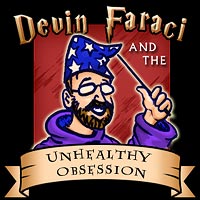 This review has spoilers. Don’t read it if you have not read the book. Obviously this makes it useless as a review, but this is the seventh book in a massively popular series, and if you don’t know if you’re going to want to read it already, no review will sway you. Jerk.
This review has spoilers. Don’t read it if you have not read the book. Obviously this makes it useless as a review, but this is the seventh book in a massively popular series, and if you don’t know if you’re going to want to read it already, no review will sway you. Jerk.
I didn’t think it would take me this long to read Harry Potter and the Deathly Hallows, but I’m sort of glad that it did, that I was able to savor this book more than the last two, which I devoured in hours. And I’m glad that I stayed clear of spoilers, even with people sending me emails with spoilers in the subject line. Classy work, fellas. At any rate, I finally finished the final book in JK Rowling’s epic and I have to stand and give her an ovation for doing it – she stuck the landing.
Too many series peter out or fall apart at the end. Every week it seems that I see another movie that can’t figure out what to do in the third act, let alone the final reel. And yet here is Rowling, a woman who has almost been learning to write in front of our very eyes, taking on perhaps one of the most massive pop cultural challenges of the decade and finishing off her beloved series and doing it damn well, making the last book possibly the best of them all. Looking at how David Chase fared after his ending of The Sopranos didn’t meet everyone’s expectations, I wondered how Rowling would meet her even more demanding audience. Perfectly, it turns out.
Which doesn’t mean the book is perfect – there’s some stuff in the middle that could stand to have been cut right out, replaced by ‘And they traveled like that for months,’ and I have to admit to being somewhat frustrated at the massive scope of activity just outside the page – but six books later Rowling is a much better writer than she was at the start, and the series has done an incredible job of growing up with its basic readership. The maturity of Deathly Hallows isn’t in the form of sex or swearing (although there’s some of the second in this one, and sexuality is palpable throughout), but in the truly adult themes of responsibility and trust and decency. The maturity comes in the continuing journey of understanding that nobody is perfect and that everybody, even our most beloved authority figures, make terrible mistakes, but that mistakes can be forgiven. I love that the final battle with Voldemort doesn’t hinge on Harry defeating the Dark Lord with fancy wizardry, but has our hero begging the villain to redeem himself. But the most adult theme of all is that of the acceptance of mortality that weaves throughout. We live in a society very much in tune with Voldemort and his Death Eaters, trying to hold off our own demises in any way possible, living in fear of death, but Deathly Hallows hinges on the simple act of accepting the finality of life. When Harry Potter has a chance to bring his dead loved ones to life he doesn’t do it to conquer their fate but to get their love and strength. The characters who died remain dead, and their deaths – and in turn their lives – have meaning.
I have to admit that the resurrection scene was where I began getting weepy. The final hundred pages of the book left me a tear stained, broken man, both from the overwhelming tragedies that the seemingly cruel Rowling throws at us – Tonks AND Lupin?! – and the soaring triumphs of spirit and character that bring the final vanquishing of fear and Voldemort. In the unneeded but totally adored epilogue, the revelation of Harry’s son’s middle name almost did me in completely, bringing the character of Severus Snape to a wonderful and beautiful conclusion. It’s embarrassing to admit that as a grown man of 33 I found myself crying at the end of what is ostensibly a children’s book, but I can’t lie to my faithful audience.
I’m excited to have the whole story here. I don’t know how much of it Rowling knew back in the 90s when she started, but she expertly ties so many things together that I don’t care if she made it up on the fly. The satisfaction that comes at the end of the book is immense, even if I wish she had just told me what Harry’s eventual job was. I’ve not been an obsessive re-reader of the books – in fact attempts at the first two have stymied me in a big way – but I appreciate the way themes and concepts, such as the treatment of House Elves, come back in a big way at the end of the series, and not just as lip service but as major components of the resolution.
Not being disappointed would have been a wonderful thing after reading Harry Potter and the Deathly Hallows; feeling completely happy and satisfied and content with the conclusion is a joy. I love this world, and these characters, but I must admit that I hope Rowling doesn’t go back. With more money than the Queen of England she doesn’t actually need to do it for the payday, and I hope she doesn’t decide to do it for the heck of it. There are many more stories I would love to read, but sometimes being left wanting is the best way for it all to end.